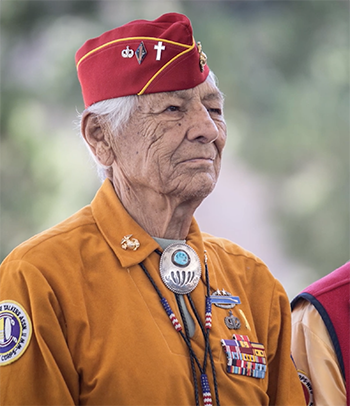Each year on Aug. 14, we honor the heroic efforts of the Navajo Code Talkers and their vital role in World War II. If you don’t know much about these selfless Americans and their incredible story, now’s your chance to find out.
In 1942, 29 Navajo men were recruited to join the U.S. Marines to develop an unbreakable code based on their native language—a code that would be used across the Pacific in every major assault from 1942-1945.
Background
Native American soldiers have fought and sacrificed for our country as far back as the Revolutionary War, fighting alongside George Washington and his men. But in World War II, Native Americans, many from the Navajo Nation, played a unique and critical role as radio code talkers in the Marine Corps.
During the early days of World War II, the U.S. military knew it needed a better way to convey its top-secret messages. It needed a code that could not be broken by the Japanese. But could such a code be developed? The answer is yes. In 1942, 29 Navajo men were recruited to join the U.S. Marines to develop an unbreakable code based on their native language—a code that would be used across the Pacific in every major assault from 1942-1945.
The Unbreakable Code

The Navajo Code Talkers created a code based on the grammatically and phonetically complex Navajo language that few people outside of the tribe knew or understood. The 29 Navajo men were able to confuse the enemy with sounds never heard before by their code experts. They took their language and assigned a Navajo word to each English letter, and in addition, assigned words to key phrases and military tactics. For example, the Navajo word for eagle was used to represent a transport plane, while a destroyer was coded as the Navajo word for shark. But even if a person could understand the Navajo language, the code was even more complex. According to a Department of Veterans Affairs blog, a person fluent in the language would hear a message that translated into a list of words that had no connection to each other, whereas a code talker would hear a very clear message. Here is an example to highlight the complexity of the code from the same blog:
Navajo Code: DIBEH, AH-NAH, A-SHIN, BE, AH-DEEL-TAHI, D-AH, NA-AS-TSO-SI, THAN-ZIE, TLO-CHIN
Translation: SHEEP, EYES, NOSE, DEER, BLOW UP, TEA, MOUSE, TURKEY, ONION
Deciphered Code: SEND DEMOLITION TEAM TO …
Despite its complexity, the new code reduced the amount of time it took to transmit and receive secret messages. Instead of taking several minutes to send and receive one message with the help of a coding machine, Navajo code talkers could send several messages within seconds. This saved valuable time on the battlefield and ensured important messages arrived in time to make lifesaving decisions.
The Importance of the Code
 In all, more than 400 Navajo men were recruited to serve as elite cryptographers. The Navajo Code Talkers used their unbreakable code to assist in every major operation involving the U.S. Marines in the Pacific, including during the battle of Iwo Jima, where they successfully transmitted more than 800 messages without error. The Japanese and their code experts never broke the Navajo code. Countless lives were saved, and the tides of the war were forever altered by the sacrifice of these men.
In all, more than 400 Navajo men were recruited to serve as elite cryptographers. The Navajo Code Talkers used their unbreakable code to assist in every major operation involving the U.S. Marines in the Pacific, including during the battle of Iwo Jima, where they successfully transmitted more than 800 messages without error. The Japanese and their code experts never broke the Navajo code. Countless lives were saved, and the tides of the war were forever altered by the sacrifice of these men.
Ways to Celebrate
When the Navajo Code Talkers returned from the war, the instrumental role they played was kept a secret. For decades, the U.S. government did not allow anyone to discuss the code talkers, believing they may want to use the code again. But in 1982, President Ronald Reagan declassified the information and established Navajo Code Talkers Day by presidential proclamation. It was finally time for the brave men to get the recognition and honor they deserved.
Today, especially in a state like Arizona, where Aug. 14 is a legal state holiday, we can reflect upon the enormous sacrifice and courage of the men from the Navajo nation and celebrate their contributions to our country’s history. Events local to Arizona and areas in the Southwest take place on Aug. 14, but no matter where you live, you can honor these men and learn more about their incredible stories.
Let’s remember the 400 Navajo men who trained to become code talkers and made invaluable contributions to our country’s history and teach others about the unbreakable code that helped secure the Allied victory in World War II.







